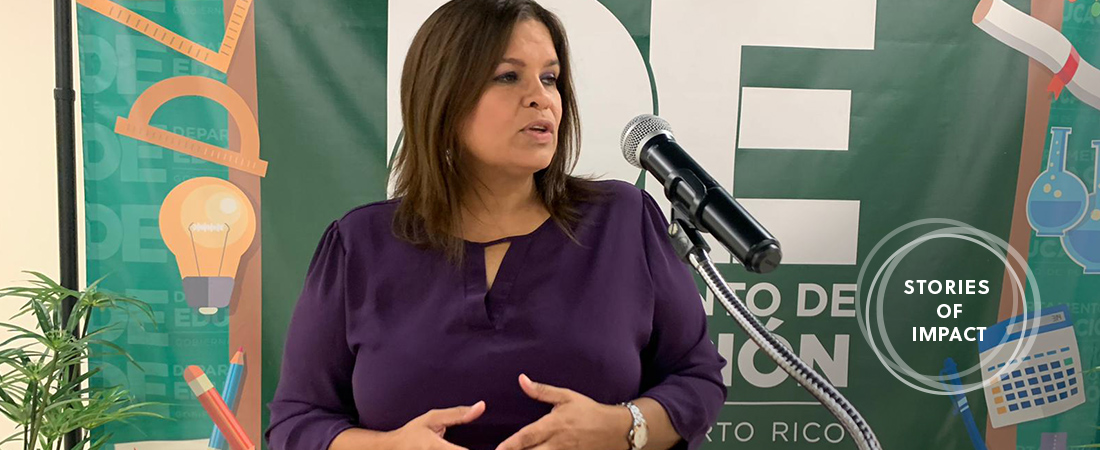Teachers Visualize Better Learning in Puerto Rico

Daisy Hernández González is part of efforts to use education data to improve learning in Puerto Rico
Although schools in Puerto Rico have shut down amid the COVID-19 pandemic, work to improve the classroom experience has continued.
“Our job is to help students succeed,” says Daisy Hernández González, assessment director for the Puerto Rico Department of Education (DEPR).
To support school improvement across the island, Hernández González is working with EDC to lead an initiative to train data coaches, who help K–12 educators use data to inform classroom practices. As part of the Puerto Rico Research Partnership to Promote the Use of Education Data, Hernández González and a team of data coaches receive ongoing training and guidance from REL Northeast & Islands at EDC.
So far, the initiative has trained 25 data coaches to work with 1,120 schools across the island’s seven regions—guiding educators on how to use data to inform classroom practice and improve student outcomes.
“Evaluating student performance doesn’t mean just looking at standardized test scores at the end of the year,” Hernández González explains. “Every quiz, every test, every assessment, every oral activity in class provides an opportunity to identify our students’ weaknesses and strengths. To do that, we need to build effective data use among our teachers and school leaders.”
Hernández González understands the challenges of the classroom. A former English and special education teacher, she joined the REL Northeast & Islands pilot as a data coach in 2016 and became a champion of creating a “culture of data use.” In 2019, DEPR promoted her to oversee the island’s educational data coaching initiative. EDC and REL Northeast & Islands have worked closely with Hernández González and the data coaching teams to scale up the program.
“The REL has guided us through the process of organizing and analyzing data and providing our students with feedback to improve their academic achievement,” Hernández González says. “We had the idea of what we wanted to do, but they helped us make that plan and get it into action.”
Helping students achieve their goals
Since the initiative’s launch, EDC and REL Northeast & Islands staff have presented six onsite workshops in Puerto Rico, training data coaching teams on accessing, analyzing, and using educational data to differentiate classroom instruction. These include large data sets, such as the Puerto Rican government-mandated META test, as well as school reports by subject and grade and individual student growth reports.
“There are many types of data that support students’ learning beyond test scores,” Hernández González adds. “Teachers' observations, classwork and homework, attendance records, classroom behavior charts, individual education plans, data from previous years—all this data helps us identify students’ needs and differentiate instruction. Visualizing data helps educational practice focus on the center of our educational system, which is our students.”
Puerto Rico’s schools are still recovering from years of destructive hurricanes, earthquakes, and now, the COVID-19 crisis. But that hasn’t dashed Hernández González’s determination to scale up the data coaching initiative and improve K–12 education across the island. She and the DEPR are working closely with EDC and REL Northeast & Islands to create a Data Use Guidebook to give educators the tools they need to create data plans.
“Each school will have the opportunity to work with their data and their data coach,” Hernández González explains. “They will be able to write their own action plan, using the data to make instructional decisions. They need to establish attainable goals and determine how they're going to measure growth.”
With COVID-19 travel restrictions in place, REL Northeast & Islands has held virtual working sessions with the data teams and the DEPR to develop the guide, due to be published for the 2020–2021 school year.
“Daisy has been a huge help in making sure the data coaching initiative moves forward,” says EDC’s Sheila Rodriguez, a REL Northeast & Islands research associate working to help build the capacity of school-level practitioners to use data to inform classroom instruction.
Since the initiative’s launch, Puerto Rico’s educators have begun to embrace data use to help their students achieve their goals. “It’s rewarding to have directors call or email my office requesting information they need to make decisions for their schools,” Hernández González says. “They want to make decisions based on data for their work plans, teachers’ professional development, and the needs of students. Knowing we are empowering educators to use data to help students—these are the happiest times for me.”